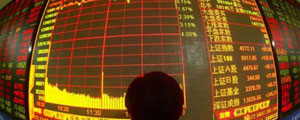
LONDON — Emerging market currencies and shares fell yesterday and the dollar rose as a spike in US debt yields drove up borrowing costs globally, overwhelming the impact of buoyant economic reports from China and Europe.
Reuters
However, with capital on the move back into developed markets, European shares and the euro bounced higher when the new business surveys confirmed expectations of strengthening recovery, lifting demand for banks and other financial stocks.
Driving the flight of funds were the minutes from the last US Federal Reserve policy meeting, which left unchanged market expectations that the central bank would taper its asset-buying programme as early as next month.
“It looks as if the minutes have done little to push back on market expectations for a Fed tapering,” said Ian Stannard, head of European foreign exchange strategy at Morgan Stanley.
That sentiment sent the 10-year Treasury note yield to a two-year high of 2,905% yesterday, and lifted the dollar against an index of the world’s major currencies by 0,25% .
Emerging markets, which rely heavily on cheap dollars to fund large current account deficits, were hit hard by the rise in Treasury yields. The currencies of India and Turkey hit new record lows and their stock markets and bond prices also fell.
The currencies of Indonesia, Malaysia and Thailand all hit multi-year lows as well, while share markets across Asia outside Japan dropped 1,1% to a six-week low.
- Chamisa under fire over US$120K donation
- Mavhunga puts DeMbare into Chibuku quarterfinals
- Pension funds bet on Cabora Bassa oilfields
- Councils defy govt fire tender directive
Keep Reading
But as data from Germany showed Europe’s largest economy expanding at its fastest pace since January, coming after a similar Chinese survey signalled expansion in world’s No.2 economy, the euro rose and European shares gained.
The Markit preliminary composite Purchasing Managers’ Index (PMI), which measures growth in both the manufacturing and services sector and covers more than two-thirds of the German economy, rose to 53,4 in August from 52,1 in July.
“It’s an increasingly buoyant-looking picture, with manufacturing seeing its best performance for a couple of years, and alongside that there’s an improving service sector, so exporters are doing well and the domestic economy is healing,” said Chris Williamson, chief economist survey compiler Markit.
The euro hit $1,3360 after the PMI was released, while Europe’s broad FTSE Eurofirst 300 index FTEU3 jumped 0,7%, snapping three days of losses.











